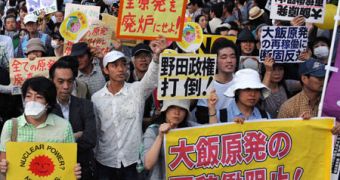Only yesterday, Tokyo's streets were taken over by Japanese citizens who rallied up to once again protest against the reopening of the Oi nuclear plant.
What makes this particular protest stand out amongst the numerous others that preceded it is the fact that nearly 170,000 people decided to actively participate in it. This means that this latest anti-nuclear manifestation is the largest so far.
Interestingly enough, this time national celebrities and acclaimed personalities decided to also join the march.
Thus, Japan Daily Press informs us that Kenzaburo Oe, an esteemed author and the winner of a Nobel Prize in literature, together with Ryuichi Sakamoto, one of Japan's most famous musicians and composers, were two of the leading figures of this gathering.
Apparently, the crowds that practically flooded Tokyo's Yoyogi Park first and foremost wished to make it as clear as possible that, until a proper explanation is found for the Fukushima nuclear disaster which took place in March 2011, Japanese citizens will not accept the country going back to using nuclear power.
More precisely, they expect that high officials investigate every nook and cranny of said nuclear accident and agree to do everything in their power to prevent something similar from happening again in the future.
The same source informs us that not only did Japanese citizens voice their complaints against the country's once again relying on nuclear power as an energy source, but that they also asked that Japan's current Prime Minister, Yoshihiko Noda, stepped down from office.
As one can easily guess, this demand is based on the fact that said PM is the one who gave the order for the Oi nuclear plant to reopen as soon as possible, so as to avoid a potential energy crisis.
From where we stand, the Japanese people seem highly determined to put an end to the country's dependence on nuclear power, and odds are that protests will not end until the national government starts paying more attention to the will of those it is supposed to look after.

 14 DAY TRIAL //
14 DAY TRIAL // 